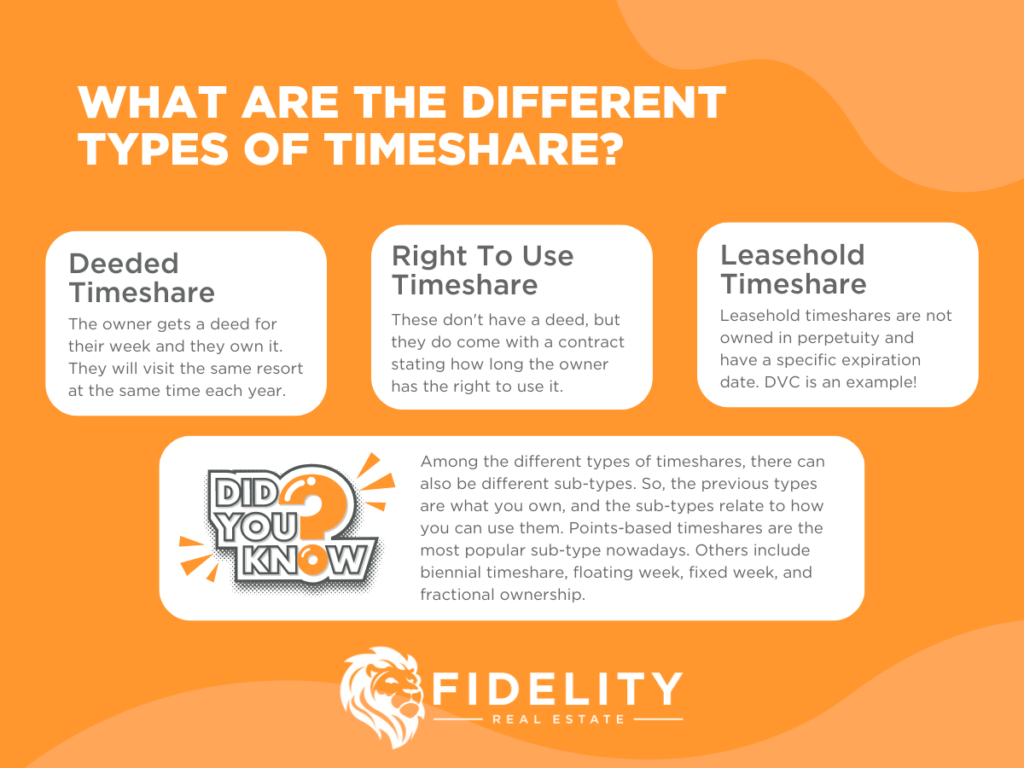Not quite sure which timeshare types may work for you? We get it. With so many types of timeshare to choose from, settling on the right one can be difficult. But we’re here to make it easy for you! You need a timeshare as flexible or rigid as your schedule, with a spectacular vacation club to match. So, what are we waiting for? Let’s dive in to the different types of timeshare so you can get started traveling with your ideal ownership.
Different Types of Timeshare Ownerships

So, before we get into the nitty gritty, we’ll start with the basics of the timeshare industry. This first list pertains to the general types of contracts and ownerships available with timeshares. There are many different types of timeshare property, from deeded ownership of real property to right-to-use ownership that expires, to even leasehold ownerships that are a blend of the two. Savvy timeshare buyers know the difference, and soon, you will too!
Deeded Timeshare
First, a deeded-week timeshare means that the owner literally gets a deed for their week, and they own that week. It is commonly called fee simple in real estate terms. Since it is a deeded week, the owner has the option to sell their timeshare, rent it out, and give it away if they wish to. Owners can rent it out for that specified week during the years they don’t use it. Moreover, deeded week timeshares were the most common when timeshares originated. And although there are still timeshares like this available on the timeshare market, many companies have moved away from deeded weeks in favor of flexibility.
Right-to-Use Timeshare
Next up in the list of timeshare types is the right-to-use timeshare. Right-to-use timeshares (RTU) do not come with a deed, but they do come with a contract stating how long the owner has the right to use it. Again, there is no legal “ownership” interest involved in this timeshare. Owners of these types of timeshare don’t have the burden of maintenance fees for their entire lives. Most right-to-use leases are over after 20-30 years, depending on what is specified in the original agreement. However, owners can still sell their ownership to somebody else on the resale market, but the time of use does not reset. For example, if an owner decides to sell their RTU timeshare after 10 years of signing the contract for 30 years of use, the new owner will enjoy 20 years of ownership.
Leasehold Timeshare
Finally, you have the leasehold timeshare, which has much of the same benefits as RTU timeshare. With a leasehold, owners have basic ownership, interests, and obligations. But like a RTU timeshare, leasehold timeshares are not owned in perpetuity and have a specific expiration date. These expiration date tend to extend longer than RTU timeshares, at 30 to 99 years. It differs by state if there is a deed involved in this ownership, and these timeshare types cannot be willed or inherited. Disney Vacation Club is the most prominent example of a leasehold timeshare.
Different Types of Timeshare Sub-Types



Among the different types of timeshare, there can also be different sub-types. So, the above categories are what you own, and the below sub-types are the types within those timeshares, as well as some terms that relate to how often you can use them. For example, DVC is a leasehold timeshare, but it is also a points-based timeshare. It’s also important to note that the addition of a vacation exchange membership, such as that with RCI or II, makes many of these timeshare types more flexible. This is because owners can often exchange their week for a stay at a different resort offered by the vacation exchange company. Now, let’s dive in.
Points-Based Types of Timeshare
The most popular (and most common) types of timeshare today is the points-based timeshare. An owner will purchase a timeshare in the form of vacation points for their home resort. The points can then be used as vacation currency to stay at the owner’s home resort or exchanged to stay at other resorts in the brands’ network. Disney Vacation Club is a points-based timeshare vacation club, along with most Hilton Grand Vacations and Hyatt Vacation Club timeshares. Each year, you get a certain allotment of points, and you can use them how you want.
For example, if you own a bunch of Disney Vacation Club points, you can use them all for a weekend in a large unit. Or, you could stay in a smaller unit for one week, or even two weeks, depending on how many points you have. Moreover, any unused points (depending on the timeshare developer) are typically banked to be used the next year. Similarly, many vacation clubs allow you to borrow points from future years to take grander vacations now.
Biennial Timeshare Types
Next up in timeshare types is the biennial timeshare. A biennial timeshare is a timeshare that has usage rights every other year. Biennial timeshares are differentiated by the year they can be used: odd year and even year! These can be great for travelers who only want to timeshare every other year at a resort location, and who also want to save on their timeshare interests.
Floating Week Timeshare Ownership
A floating week timeshare types gives owners the ability to choose the week they stay at a resort within a specific period or season. Usually, if an owner purchases a summer season floating week timeshare, they can visit their unit during any one available week as long as it is in the season they purchased. Floating timeshares give more flexibility than fixed weeks but not as much as point-based timeshares.
Fixed-Week Types of Timeshare
Fixed-week timeshare purchases are the traditional timeshare usage. Having fixed-week timeshare types of timeshare means you have the right to visit your property during the same week each year. You will have usage rights, usually for one week, to stay at the resort. The rest of the year, other owners utilize it. Timeshare weeks are great if you plan to travel during a specific week each year. In addition, this type of vacation ownership helps you to create an annual tradition. You have a set week in the same unit each year, providing you with unforgettable memories at a beloved resort.
Fractional Ownership
Fractional ownership is similar to timeshare, but fractional owners purchase and have rights to a much larger portion of a resort. Instead of the unit and time being split by 52 weeks among 52 owners, it is divided by fourths, eights, or even thirteenths. So, this means they visit more often or stay longer than the typical fixed-week owner. This is a rare occurrence, but worth mentioning.
Best Timeshare Brands with Different Types of Timeshare Ownerships



The best hospitality brands offer world-renowned timeshares that vacation owners love year after year. They have resorts in top locations across the United States, as well as abroad. Not to mention, Fidelity Real Estate’s secondary market boasts vacation real estate at a fraction of the price of retail. So, check out some of the best vacation clubs below and their featured resorts. If find a property that catches your eye, take a look at the listed contracts. You can even put an offer in on the one you like the most!
Types of Timeshare Q&A
Which Timeshare Type Should I Buy?
As a buyer trying to decide which type of timeshare ownership is better for you and your family, it is essential to weigh your values. Do you value flexibility and visiting new resorts? If the answer is yes, you should purchase a points-based contract. In contrast, do you value making one resort your home away from home and visiting the same location on the same dates each year? If the answer is yes, you should purchase a fixed-week or floating-week ownership.

There are a few different types of ownership, so it can be a bit overwhelming trying to decipher it all. If you want to learn more about the different types of timeshares, check out this video. In the video, we break every type down, so you can decide which ownership is best for you!
Browse Timeshare Resales with Different Types of Timeshare

There are so many different types of timeshare options to meet your vacation lifestyle needs. What’s more, our timeshare resales span across Orlando, California, and Hawaii. We even have international resorts! Think Cancun, the Thailand, and Europe. So, you’re sure to find a resort that meets your desires. If you’d like to buy a timeshare, simply find one you like on our marketplace and make an offer. Buyers can also browse by timeshare companies if they have a preference for which brand they want to own with. We make it simple to purchase the perfect timeshare for you and your family!
Sell Different Types of Timeshare with Fidelity Real Estate
If you’re thinking of selling your timeshare for any reason, we’re happy to help. Simply fill out the form below to get started. Our licensed agents are resale experts, and they’ll be happy to help you find buyers for your timeshare contract. For questions and concerns, please email us at [email protected] or call us at 1-800-410-8326.







